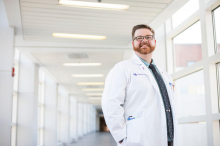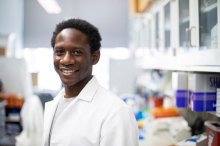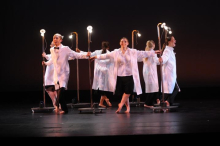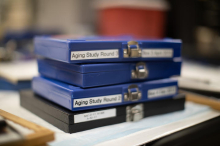Cancer, COVID and the Kentucky Economy: How 'Sweet Annie' Could Make an Impact
LEXINGTON, Ky. (Aug. 11, 2020) — With the morning sun rising in the sky at the University of Kentucky’s sprawling Spindletop Farm, Patrick Perry is in high spirits, smiling behind his reflective shades as his tractor roars to life. His student workers, UK seniors Chris Bankes and Tyler Miles, take Styrofoam float beds loaded with tiny seedlings of the plant Artemisia annua and attach them to a mechanical transplanter hitched to the tractor.
Announcing TISA
UK's College of Medicine has announced the Alliance Initiative, a transdisciplinary effort from 18 teams to advance important areas of research related to each team's expertise. The Center for Health Services Research, in collaboration with the Markey Cancer Center and Gill Heart & Vascular Institute, has been selected to form one of the Alliance Initiative teams.
COVID-19 may disproportionately affect patients with Alzheimer’s disease, dementia
The COVID-19 pandemic has impacted research, outcomes, long-term care and disparities related to Alzheimer’s disease and other dementias, according to presenters at the Alzheimer’s Association International Conference 2020.
Regarding its effects on research, Gregory Jicha, MD, PhD, chair of the Alzheimer’s Association Clinical Trials Advancement and Methods professional interest area, highlighted steps to safely conduct Alzheimer’s disease-related studies in the current pandemic environment.
CHET Core Faculty Member Chosen to Lead New Research Initiative
Congratulations to Dr. Danelle Stevens Watkins, Assistant Vice President for Research in Diversity and Inclusion, Director of Graduate Studies in the UK College of Education, and CHET Core Faculty member for being chosen to lead the newly established UNITE Research Priority Area.
UK Neuropsychologist Shares the Science Behind ‘Toxic Stress’
LEXINGTON, Ky. (Aug. 10, 2020) — Most of us have heard the phrase that some stress is good. Timothy Ainger, Ph.D., assistant professor in the University of Kentucky Department of Neurology, says the word ‘some’ is key. Ainger specializes in neuropsychology which is the brain-behavior relationship. He says it is true that a small to moderate amount of stress or pressure does help a person focus and perform at their best.
Virtual Morning Light 5K
Complete the Race anytime between Friday, August 14 and Saturday, August 29, 2020 for the Virtual Morning Light 5k to help raise money for UK Sanders-Brown Center on Aging!
Race fee includes race t-shirt. Medals will be awarded for top performers in each age category.
$25 for Early Bird registration until July 31st.
$30 for registration starting August 1st.
To register, click here.
UK Research Center Establishes Scholar Program to Promote Diversity in Neurotrauma Studies
LEXINGTON, Ky. (Aug. 6, 2020) — For a couple of years now members of the University of Kentucky Spinal Cord and Brain Injury Research Center (SCoBIRC), in collaboration with UK College of Arts and Sciences, have been working to increase the representation of Black undergraduate students in neuroscience.
Publications for the month of July 2020
The Department had nine publications listed in PubMed for the month of July 2020.
1: Arenas A, Chen J, Kuang L, Barnett KR, Kasarskis EJ, Gal J, Zhu H. Lysine acetylation regulates the RNA binding, subcellular localization and inclusion formation of FUS. Hum Mol Genet. 2020 Jul 21:ddaa159. doi: 10.1093/hmg/ddaa159. Epub ahead of print. PMID: 32691043.
2: Eleazer R, Fondufe-Mittendorf YN. The multifaceted role of PARP1 in RNA biogenesis. Wiley Interdiscip Rev RNA. 2020 Jul 12:e12607. doi: 10.1002/wrna.1617. Epub ahead of print. PMID: 32656996.









